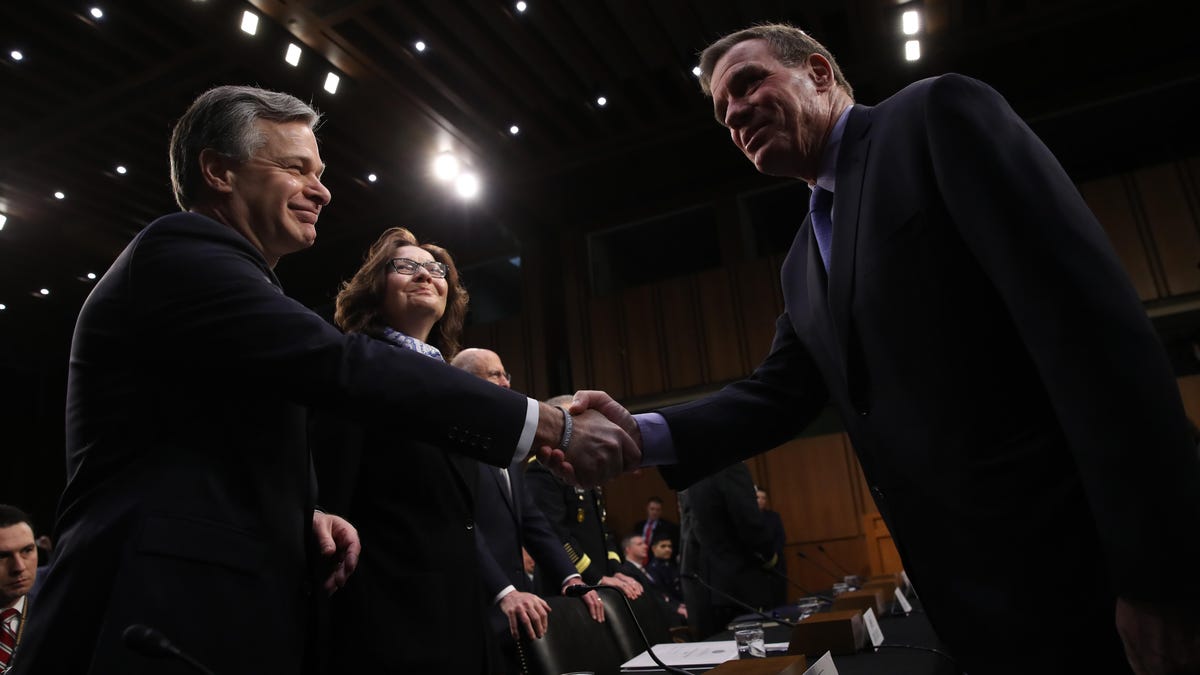Deepfakes, disinformation among global threats cited at Senate hearing
Technology concerns top the list for US intelligence leaders.

Senate Intelligence committee ranking member Sen. Mark Warner, right, shakes hands with FBI Director Christopher Wray, as CIA Director Gina Haspel looks on.
At this year's Worldwide Threats hearing before the US Senate's Select Committee on Intelligence, the leaders of the country's top intelligence agencies, including the National Security Agency, the CIA and the FBI, again pointed at tech issues as their biggest worry.
The Tuesday hearing covered issues like weapons of mass destruction, terrorism, and organized crime, but technology's problems took center stage. That echoes last year's hearing, when officials flagged cybersecurity as their greatest concern, after major hacks like the NotPetya attack, which cost billions in damages. But concerns over technology aren't limited to cyberattacks: Lawmakers also brought up deepfakes, artificial intelligence, disinformation campaigns on social media, and the vulnerability of internet of things devices.
"We're now living in yet another new age: the time characterized by hybrid warfare, weaponized disinformation, all within the context of a world producing more data than mankind has ever seen," Sen. Richard Burr, chairman of the Intelligence committee, said in his opening remarks.
Disinformation on social media was a major worry at the 2018 hearing, and it's only grown in the last year.
During the 2016 US presidential election, Russian operatives posed as Americans on Facebook, Twitter, YouTube and Instagram, pushing narratives on divisive issues like race, gender and inequality in attempts to influence the election.
Director of National Intelligence Dan Coats said election security was a top priority for the intelligence community, warning that foreign nations will attack the 2020 US elections through social media.
"We expect Russia will continue to wage its information war against democracies and use social media to attempt to divide our societies," Coats said.
Despite the efforts of Facebook, Twitter and Google to stop foreign actors on social media, the attacks have only grown. The disinformation campaign from Russia was in effect during the 2018 US midterms, while countries like Iran and China have used the same tactics on social media since.
Lawmakers are also concerned these attacks over social media will ramp up during the 2020 race for the White House.
"When this country's democracy was attacked in 2016, it wasn't with a bomb or a missile or a plane. It was with social media accounts that any 13-year-old can establish for free," Sen. Burr said.
Lawmakers are also turning their attention to deepfakes, which threaten to intensify disinformation. Artificial intelligence has allowed people to make convincingly fake videos of people, raising issues of digital impersonation spreading online. In a September letter, a group of lawmakers noted their concerns with deepfakes, and on Tuesday, Coats said the fakes would get harder to handle as machine-learning improves.
"It's a very quickly evolving flood of technological changes that poses a major threat to the United States, and something the intelligence community needs to be restructured to address," Coats said.
The hearing also drew out tech concerns over countries like China, which the Department of Justice said was involved in 90 percent of economic espionage cases. On Monday, prosecutors filed 23 charges against Chinese tech giant Huawei, accusing the company of stealing US tech secrets.
Sen. Mark Warner, a Democrat from Virginia and the vice chairman on the committee, noted his worries about China in his opening remarks. Warner has also co-sponsored a bill with Sen. Marco Rubio, a Republican from Florida, over these concerns.
"Especially concerning have been the efforts of big Chinese tech companies, which are beholden to the CCP [Chinese Communist Party], to acquire sensitive technology, replicate it, and undermine the market share of US firms with the help of the Chinese state," Warner said.
Best Super Bowl TV deals: Buying a new TV for the big game? These are your best choices.
How to watch the Super Bowl: Watch the game in the US for free, on TV or online.

